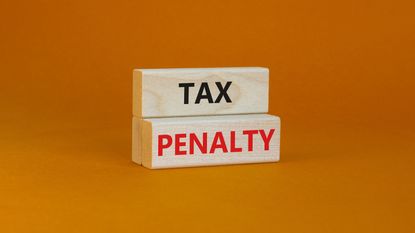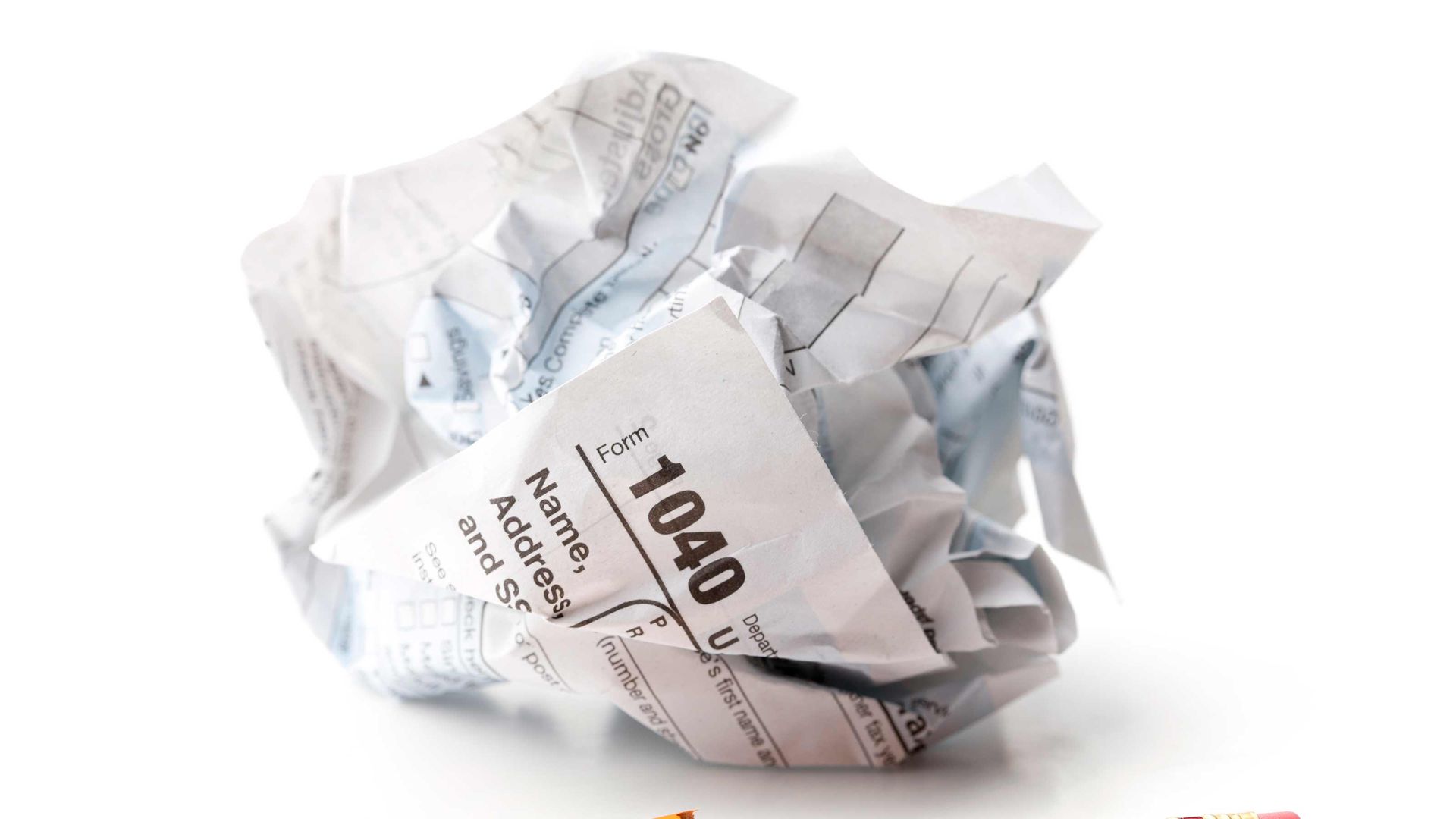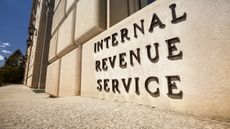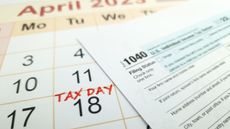Penalties for Filing Your Tax Return Late
Stiff penalties await those who didn't file their return (or pay any tax owed) by the tax filing deadline.
- (opens in new tab)
- (opens in new tab)
- (opens in new tab)
- Newsletter sign up Newsletter


We normally "celebrate" Tax Day on April 15, but it was April 18 this year for most people because the 15th fell on a weekend. If you knew you weren't going to be able to file your 2022 federal income tax return in time, you could have requested an extension to file your return until October 16 (but you still had to pay the tax you expect to owe by your original due date).
But, of course, some people missed the Tax Day deadline and didn't request an extension. And, as you might guess, the IRS doesn't take that lightly and will make you pay a price. If you're curious about what punishment the IRS is going to bring down on you, here's a glimpse of the interest and penalties you may face if you didn't act before the tax deadline.

Interest
Interest accrues on your unpaid balance and compounds daily from April 18 (which was the tax deadline for most people) until you pay the balance in full. Interest rates on underpayments of tax are set each quarter. For non-corporate taxpayers, the rate is equal to the federal short-term rate plus three percentage points. The current interest rate for underpayments is 7% (for first quarter of 2023).

Late Payment Penalty
If you didn't pay the tax you owe on time, the IRS will impose a late payment penalty equal to 0.5% of the tax owed after April 18 for each month, or part of a month, the tax remains unpaid. The penalty is capped at 25% of the amount owed. The rate jumps to 1% ten days after the IRS issues a final notice of intent to levy or seize property. However, the penalty is only 0.25% for each month, or part of a month, in which an IRS installment agreement is in effect.
You won't have to pay the penalty if you can show "reasonable cause" for the failure to pay on time. Reasonable cause is based on all the facts and circumstances in your situation. The IRS will consider any sound reason for failing to pay your taxes on time, including:
- Fire, casualty, natural disaster or other disturbances;
- Inability to obtain records;
- Death, serious illness, incapacitation or unavoidable absence of you or a member of your immediate family; or
- Other reason that establishes that you used "all ordinary business care and prudence" to meet your federal tax obligations but were nevertheless unable to do so.
Simply not having the money, in and of itself, is not reasonable cause for the failure to pay taxes on time. However, the reasons for your lack of funds may meet reasonable cause criteria for the failure-to-pay penalty.
When you finally pay, the IRS will first apply the payment to the tax you owe, then to any penalty, and then to any interest. A penalty amount that appears on your bill is generally the total amount of the penalty up to the date of the notice, not the penalty amount charged each month.

Failure-to-File Penalty
If you didn't file your return by Tax Day and didn't request an extension to file, the IRS can impose a 5% failure-to-file penalty on any unpaid taxes for each month, or part of a month, that your tax return is late. However, the penalty won't exceed 25% of your unpaid taxes.
The late filing penalty is calculated based on the tax that remains unpaid after April 18 or, if an extension is granted, after October 16. Unpaid tax is the total tax shown on your return reduced by amounts paid through withholding, estimated tax payments, and allowed refundable credits.
If your return is over 60 days late, the minimum failure-to-file penalty is the smaller of $435 (for tax returns required to be filed in 2023) or 100% of the tax required to be shown on the return.

Double Penalties
If you still haven't paid what you owe five months after Tax Day, the failure-to-file penalty will max out, but the failure-to-pay penalty continues until the tax is paid, up to 25%.
If both a failure-to-file and a failure-to-pay penalty apply in the same month, the combined penalty is 5% (4.5% late filing and 0.5% late payment) for each month, or part of a month, that your return was late, up to 25%. The maximum total penalty for failure to file and pay is 47.5% (22.5% late filing and 25% late payment) of the tax.
Rocky Mengle was a Senior Tax Editor for Kiplinger from October 2018 to January 2023 with more than 20 years of experience covering federal and state tax developments. Before coming to Kiplinger, Rocky worked for Wolters Kluwer Tax & Accounting, and Kleinrock Publishing, where he provided breaking news and guidance for CPAs, tax attorneys, and other tax professionals. He has also been quoted as an expert by USA Today, Forbes, U.S. News & World Report, Reuters, Accounting Today, and other media outlets. Rocky holds a law degree from the University of Connecticut and a B.A. in History from Salisbury University.
-
-
 For Best Tax Savings, Year-Round Tax Planning Is Essential
For Best Tax Savings, Year-Round Tax Planning Is EssentialFor optimal, ongoing tax reduction, consider employing these nine strategies throughout the entire year.
By Andy Leung, Private Wealth Adviser • Published
-
 From SECURE Act to SECURE 2.0: Is Your Estate Plan Safe?
From SECURE Act to SECURE 2.0: Is Your Estate Plan Safe?The ever-evolving legislative landscape provides both challenges and opportunities when it comes to making plans for your retirement and your estate. A key focus: tax planning.
By Lindsay N. Graves, Esq. • Published
-
 Supreme Court to Decide if IRS Can Secretly Obtain Bank Records
Supreme Court to Decide if IRS Can Secretly Obtain Bank RecordsAmong other high-profile issues, the Supreme Court is considering a case involving taxpayer privacy and the IRS.
By Kelley R. Taylor • Last updated
-
 IRS Says File Soon for $1.5 Billion in Unclaimed Tax Refunds
IRS Says File Soon for $1.5 Billion in Unclaimed Tax RefundsUnclaimed tax refunds from 2019 are waiting for millions of people who might not know it – but only if they file the pandemic-era tax return soon. Are you one of them?
By Kelley R. Taylor • Published
-
 IRS $80 Billion Plan Targets Taxpayer Compliance, Improved Service
IRS $80 Billion Plan Targets Taxpayer Compliance, Improved ServiceThe IRS unveiled its much-anticipated strategic operating plan detailing how the agency will spend $80 billion in funding allocated over 10 years under the Inflation Reduction Act.
By Kelley R. Taylor • Published
-
 Etsy, eBay, PayPal Want IRS 1099-K Relief for Online Sellers
Etsy, eBay, PayPal Want IRS 1099-K Relief for Online SellersCompanies like ebay, Etsy, and PayPal want Congress to raise the new $600 reporting threshold for IRS Form1099-K to give relief to millions of sellers who use their sites.
By Kelley R. Taylor • Published
-
 Tax Scam: IRS Warns Taxpayers Against Filing False W-2 Info
Tax Scam: IRS Warns Taxpayers Against Filing False W-2 InfoScams A new tax scam on social media advises lying on your W-2 to falsely claim credits and bigger refunds.
By Ben Demers • Published
-
 Is Your First RMD Due April 1?
Is Your First RMD Due April 1?An important required minimum distribution (RMD) deadline for some retirees is just around the corner.
By Kelley R. Taylor • Published
-
 How to Find a Tax Preparer: What to Look for in a Tax Professional
How to Find a Tax Preparer: What to Look for in a Tax ProfessionalYou want to find a tax preparer who's qualified, reasonable and knowledgeable to file your taxes. How do you get a tax professional that's right for you?
By Joy Taylor • Published
-
 Tax Day 2023: When is the Last Day to File Your Taxes?
Tax Day 2023: When is the Last Day to File Your Taxes?tax deadline Tax Day for most people is today — April 18. This is when federal income tax returns are due. But some people have some extra time to file. Are you one of them?
By Rocky Mengle • Last updated










